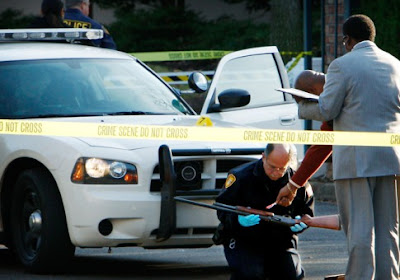 |
| America's Most Miserable Cities |
California has never looked less golden, with eight of its cities making the top 20 on our annual list.
No. 1 Stockton, Calif.
Unemployment has averaged 14.3% the past three years, which is third worst in the country among the 200 largest metro areas. The housing market collapsed as well, with home prices down 58% over the same time. All the California cities on the list are struggling with the inherent problems the state is facing, including high sales and income taxes and service cuts to help close massive budget shortfalls.
No. 2 Miami, Fla.The sun and lack of a state income tax are the only things keeping Miami out of the top spot. Foreclosures hit one in 14 homes last year. Corruption is also off the charts, with 404 government officials convicted of crimes this decade in South Florida.
No. 3 Merced, Calif.
The economic downturn and busted housing market hit Merced harder than any other area in the country. Average unemployment of 16.2% since 2008 is the highest in the U.S., as is the city's 64% drop in median home prices.
No. 4 Modesto, Calif.
The median home was valued at $275,000 in 2006; today it is $95,000. And don't leave your car on the street in Modesto, where 3,712 vehicles were stolen in 2009, making for the second-highest auto theft rate in the country. It ranked first in four of the previous five years.
No. 5 Sacramento, Calif.
No state taxes $50,000 of income like California, with a rate of 9.55% for that middle-class tax bracket. Sacramento is a one-team sports town, and that team has been awful in recent years. The NBA's Kings have won just 26% of their games the past two-plus seasons.
No. 6 Memphis, Tenn.
Tennessee is one of nine states without an income tax (it does tax dividends and interest income), yet it hits residents with one of the highest sales tax rates in the U.S. at 9.25%. Violent crime was down 5% in 2009 according to the FBI, but still is tops in the country.
No. 7 Chicago, III.
Baseball's Cubs used to be lovable losers, but $140 million payrolls and 102 years and counting without a World Series title is miserable. Chicago had the highest sales tax among big cities at 10.25%, but it was rolled back to 9.75% last year and now matches Los Angeles and Oakland for the top rate.
No. 8 West Palm Beach, Fla.
The West Palm-Boca Raton area might sound glamorous with its beaches and million-dollar ocean-front homes. The reality is much different as the median home is worth $225,000, down 39% the past three years. Prices are expected to fall a further 22% this year as foreclosures continue to affect the housing market. Unemployment was recently at 12.3%.
No. 9 Vallejo, Calif.
This one-time Navy town became the largest California city to file for bankruptcy when it entered Chapter 9 protection in 2008. Unemployment is expected to average 12.5% this year, up from 4.9% five years ago.
No. 10 Cleveland, Ohio
Last year's most miserable city drops back thanks to a housing market that never overheated and therefore hasn't crashed like many other metros'. The weather is lousy, corruption persistent and it's a tortured sports market, with no championships since 1964. LeBron James' departure delivered the latest cruel blow last summer.
No. 11 Flint, Mich.
Weather, crime and unemployment are some of the top misery factors in the birthplace of General Motors. Flint's downward spiral is tied to GM's pullout from the city; GM employment in Flint has fallen from 80,000 in the 1970s to less than 8,000 today.
No. 12 Toledo, Ohio
A recent economic analysis of the Toledo metro forecast that employment would not return to pre-recession levels until after 2025. Unemployment has averaged 10.6% during the past three years.
No. 13 Fort Lauderdale, Fla.
The party has slowed down at this popular vacation destination. The area's economy sagged 7% between 2007 and 2009, and it has been one of the hardest-hit areas in the country with foreclosures.
No. 14 Youngstown, OhioYoungstown has been on a steady decline since the steel mills started closing in the 1970s. Empty buildings continue to plague the city, with the vacancy rate 20 times the national average. This helped drive the average sales price for a home down to around $17,000 last year.
No. 15 Detroit, Mich.Crime, unemployment and foreclosures are among the many problems bedeviling Detroit. Motown has closed 59 schools the past two years, and a recent study suggested that the city will need to close half of the remaining 142 public schools over the next two years. The moves would lead to high school class sizes of 62 students.
No. 16 Washington, D.C.Washington has one of the healthiest economies in the country, thanks to spending by the federal government, but only New York area residents have worse commutes. And those Washington Redskins? Truly miserable.
No. 17 Fresno, Calif.Despite the ongoing economic recovery, unemployment is forecast to average 16% next year in Fresno, the highest rate among the 75 largest metro areas in the U.S.
No. 18 Salinas, Calif.
Salinas has arguably the best weather in the country, but it can't mask other problems. Home prices have fallen a staggering 61% over the past three years.
No. 19 Jacksonville, Fla.
In addition to high crime and foreclosures, Jacksonville's lone pro sports team has caused residents misery. The NFL's Jaguars have just one playoff win the past decade. Fans lashed out at owner Wayne Weaver when he announced that coach Jack Del Rio would be back in 2011 for a ninth season.
No. 20 Bakersfield, Calif.
The residents of Bakersfield are among the most uneducated in the country, with only 15% possessing a college degree and 70% a high school diploma. The U.S. averages are 28% and 85%, respectively.



































